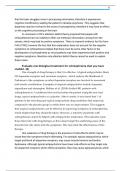6
that the brain struggles more in processing information, therefore it experiences
cognitive insufficiency, leading the patient to develop psychosis. This suggests that
dopamine may be involved in the onset of schizophrenia, therefore it may have an effect
on the cognitive processing in the brain.
In conclusion, Frith’s attention deficit theory proposed that people with
schizophrenia have an inability to filter out irrelevant information coming from the
senses, which may lead to positive symptoms. There is research evidence for this from
Frith (1992), however the fact that this explanation does not account for the negative
symptoms of schizophrenia implies that there must be some other factor in the
development of schizophrenia as most patients may often experience both positive and
negative symptoms, therefore only attention deficit theory cannot be used to explain
these cases.
Evaluate one biological treatment for schizophrenia that you have
studied. (8)
One strength of drug therapy is that it is effective. Atypical antipsychotics block
D2 dopamine receptors and serotonin receptors , which reduces the likelihood of
Parkinson's-like symptoms as other dopamine receptors are involved in movement
and muscle coordination. Examples of atypical antipsychotics include clopazine,
risperidone and olanzapine. Meltzer et al. (2014) divided 481 patients with
schizophrenia in 3 conditions that involved either the patient trying the new trial
drugs, typical antipsychotics or a placebo. After 6 weeks, it was found that ⅔ of
patients in the trial drug and typical antipsychotic drug conditions had improved,
compared to the placebo group in which there was no improvement. This suggests
that atypical antipsychotics can be effective in improving symptoms of schizophrenia,
which implies that they should be taken. However, a minority of patients with
schizophrenia cannot be helped with antipsychotic medication. This indicates some
flaws that exist with drug therapy as this cannot target the underlying cause of the
disorder but only deals with the symptoms. This may limit the effectiveness of this
therapy.
One weakness of drug therapy is the presence of side effects which may be
worse than the symptoms they’re alleviating. For example, typical antipsychotics which
target and block all dopamine receptors, may cause muscle tremors and tardive
dyskinesia. Although typical antipsychotics have fewer side effects as they target only
D2 dopamine receptors which affect perception, they may cause agranulocytosis which




